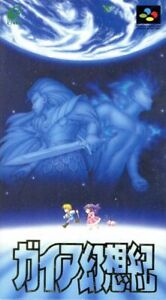Difference between revisions of "Illusion of Gaia"
| Line 45: | Line 45: | ||
<li>The priest in the Japanese version leads Will in prayer when the player speaks to hum while he leads Will in a poem in the American Version</li> | <li>The priest in the Japanese version leads Will in prayer when the player speaks to hum while he leads Will in a poem in the American Version</li> | ||
<li>The ocean monster is referred to as the Biblical Leviathan, who is part of an ocean dweller race while in the American version he's just a separate entity known as Riverson</li> | <li>The ocean monster is referred to as the Biblical Leviathan, who is part of an ocean dweller race while in the American version he's just a separate entity known as Riverson</li> | ||
| − | <li>The Japanese version indicates that Seth was | + | <li>The Japanese version indicates that that Seth's consciousness was absorbed by Leviathan while the American release indicates Seth was turned into Riverson</li> |
<li>In the Japanese version the native tribesman that were starving were cannibals, the skeletal remains scattered over the ground were their fellow tribesman they had devoured in order to survive</li> | <li>In the Japanese version the native tribesman that were starving were cannibals, the skeletal remains scattered over the ground were their fellow tribesman they had devoured in order to survive</li> | ||
<li>Will and Kara comment, at the end of the game while looking at the earth on the comet, that "This is what it must feel like to be God"</li> | <li>Will and Kara comment, at the end of the game while looking at the earth on the comet, that "This is what it must feel like to be God"</li> | ||
Latest revision as of 19:57, 28 September 2013
| Illusion of Gaia | |
|---|---|

| |
| Developer(s) Quintet | |
| Publisher(s) Enix Nintendo | |
Illusion of Gaia (ガイア幻想紀 Gaia Gensōki lit. "Records of the Illusion of Gaia") is a game developed by Quintet and published by Enix. Illusion of gaia is the second game of a loosely related trilogy involving Soul Blader, Illusion of Gaia, and Terranigma. The references in each game are loosely based from mention of a main character from another game to shared items, abilities, and sound effects.
Gameplay
Other Games in the Series
There are other games in the Quintet series that reference some common themes between the titles. The games most similar are<ref name="hardcoreGaming101">Hardcore Gaming 101: Quintet</ref><ref name="wikiQuin">http://en.wikipedia.org/w/index.php?title=List_of_Quintet_games#Soul_Blazer.2FGaia_Series</ref>:
Directly Related
Indirectly Related
References To Other Quintet Games
See Soul Blader/Gaia Series References
Possible spoilers beyond this point, tread lightly
Version differences
Interestingly the Japanese and US versions of the game not only have different box art, which is extremely common, but they also have different title screens. Changing the entire title screen is very rare and little is known as to why, it could be related to the box art. The Japanese title matches the Japanese box art and the localization team wanted to emulate that same idea when they were localizing the game.
This, of course, is the authors opinion and he has no idea what he's doing.
Censorship
A bit of censoring is prevalent in this game.
Graphical Censorship
- In the beginning of the game in Japanese there is a cross behind the priest in the school this was changed to a statue in the North American release
- The boss in the Sky Garden had its sprite changed significantly. In the Japanese version the boss is a giant bird. In the American version the boss is a winged Babylonian statue with talons. The creators of the game originally wanted it this way, but because of time constraints were unable to finish the boss's sprite. They were able to finish it completely with the American port of the game
Textual Censorship
- In the Japanese version of the game the starting school is a Christian school, probably catholic, in the American release it's just referred to as a school
- The priest in the Japanese version leads Will in prayer when the player speaks to hum while he leads Will in a poem in the American Version
- The ocean monster is referred to as the Biblical Leviathan, who is part of an ocean dweller race while in the American version he's just a separate entity known as Riverson
- The Japanese version indicates that that Seth's consciousness was absorbed by Leviathan while the American release indicates Seth was turned into Riverson
- In the Japanese version the native tribesman that were starving were cannibals, the skeletal remains scattered over the ground were their fellow tribesman they had devoured in order to survive
- Will and Kara comment, at the end of the game while looking at the earth on the comet, that "This is what it must feel like to be God"
End of possible spoilers
References
<references />